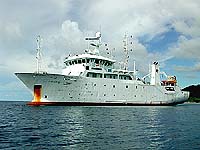 |
Paris (AFP) July 2, 2010 Oil spills can boost levels of arsenic in seawater by suppressing a natural filter mechanism on the sea bed, according to a study published on Friday in a specialist journal. The research was conducted in a laboratory before the BP oil leak in the Gulf of Mexico, but its authors say the findings highlight the worrying long-term impact from such disasters. Scientists at Imperial College London found that sea floor sediment bonds with arsenic. The captured toxic element is then covered by subsequent layers of sediment, which helps explain why concentrations of arsenic in the ocean are low. But, the researchers found, crude oil acts rather like a sticky blanket, clogging the sediment and preventing it from bonding to arsenic. As a result, seawater levels of arsenic increase -- and because the substance is accumulative, it becomes more concentrated and poisonous the more it moves up the food chain. "We can't accurately measure how much arsenic is in the Gulf at the moment because the spill is ongoing," Mark Sephton, a professor at the Department of Earth Science and Engineering, was quoted as saying in a press release. "However, the real danger lies in arsenic's ability to accumulate, which means that each subsequent spill raises the levels of this pollutant in seawater. Our study is a timely reminder that oil spills could create a toxic ticking time bomb, which could threaten the fabric of the marine ecosystem in the future." Adding to the problem, said Sephton, is arsenic that is flushed into the ocean from oil rigs or from leaks of underground oil reserves. This adds to naturally-occurring arsenic. Arsenic is found in many minerals and is present in oil. At high levels in seawater, it can disrupt photosynthesis in microcopic marine plans and increase the risk of genetic defects in aquatic life. The experiments, reported in the European journal Water Research, used a mineral called goethite, an iron-bearing oxide that is abundant on the ocean floor. However sediments vary from ocean to ocean, and the researchers say the next step to see how oil spills can affect arsenic levels according to the local marine geology.
Share This Article With Planet Earth
Related Links Water News - Science, Technology and Politics
 Deep Thinking On The World's Oceans
Deep Thinking On The World's OceansCanberra, Australia (SPX) Jun 28, 2010 The world's deep ocean researchers - scientists whose field of interest extends into the uncertain world below about 2000 metres - met in Hobart this week to discuss deep ocean changes, their causes and their implications. Changes in deep ocean conditions affect global climate, with deep warming contributing to sea-level rise and the deep ocean absorbing atmospheric carbon dioxide. T ... read more |
|
| The content herein, unless otherwise known to be public domain, are Copyright 1995-2010 - SpaceDaily. AFP and UPI Wire Stories are copyright Agence France-Presse and United Press International. ESA Portal Reports are copyright European Space Agency. All NASA sourced material is public domain. Additional copyrights may apply in whole or part to other bona fide parties. Advertising does not imply endorsement,agreement or approval of any opinions, statements or information provided by SpaceDaily on any Web page published or hosted by SpaceDaily. Privacy Statement |